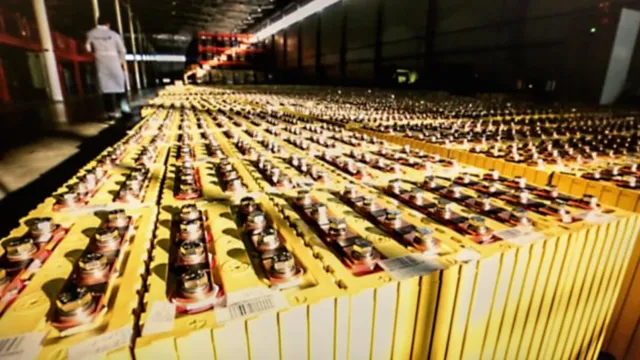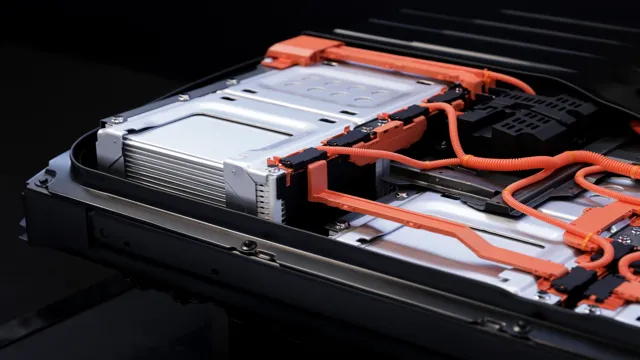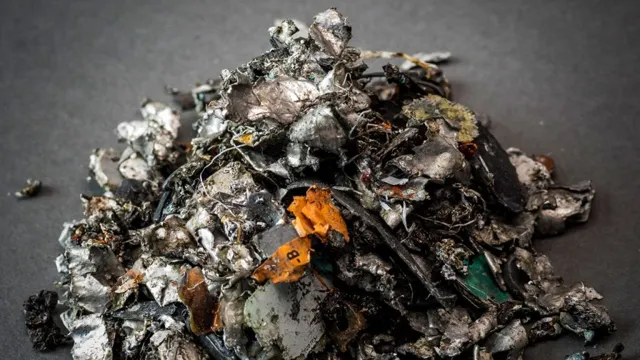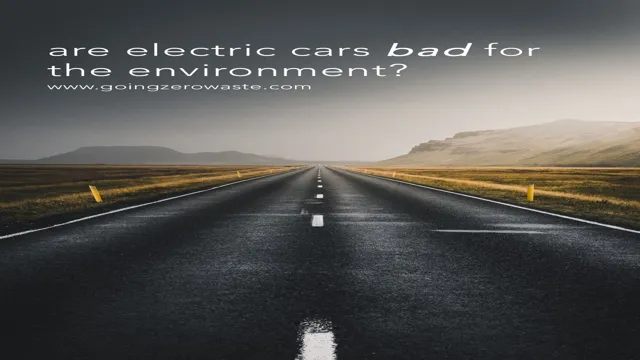Debunking the Myth: The Truth About Fossil Fuels and Electric Car Batteries
Electric cars have been hailed as one of the most significant solutions to the world’s climate crisis, with their low carbon emissions combing an increasing demand for sustainable transportation. However, there is one major challenge standing in the way of the widespread adoption of electric vehicles – the batteries that power them. While electric cars have zero emissions, the production of batteries require the use of fossil fuels.
This poses a dilemma on the fact that electric cars and fossil fuels are, in a sense, interdependent. The production of lithium-ion batteries, which are used in most electric cars, relies heavily on fossil fuels. The mining, transportation, and processing of raw materials such as lithium and cobalt requires significant amounts of energy and generates emissions.
While the emissions from building batteries are typically lower than those generated by traditional cars, they still contribute to the carbon footprint of electric vehicles. Despite this challenge, it’s crucial to note that electric vehicles still have an overall lower carbon footprint than gasoline-powered cars. The most straightforward solution in the meantime is to shift towards increased use of renewable energy sources such as wind and solar power for the production and transportation of raw materials used for batteries production.
In conclusion, electric cars may not be entirely fossil fuel-free at the moment, but it’s a step in the right direction. Plus, the transition towards renewable energy sources has already started, and it’s only a matter of time until better battery technologies come to the surface, making electric vehicles even more sustainable.
Understanding the Basics
When it comes to electric cars, many people wonder if they are really as “green” as they are said to be. One common question is whether fossil fuels are used in the production of electric car batteries. The answer is somewhat complicated, as there is no straight yes or no answer.
While the production of electric car batteries does require a significant amount of energy, which is often generated using fossil fuels, the amount of energy required is still much lower than that required to drill for and extract oil. Additionally, as renewable energy sources become more widespread, the production of electric car batteries will become even more sustainable. So while it is true that some fossil fuels may be used in the production of electric car batteries, the overall impact of these vehicles is still much lower than that of traditional gas-powered cars.
What are electric car batteries made of?
Electric car batteries are the heart and soul of modern electric vehicles. They are responsible for storing and providing the energy needed to power the car’s electric motor. So, what exactly are these batteries made of? The most common type of electric car battery is the lithium-ion battery, which is made up of several components including a cathode, an anode, and an electrolyte.
The cathode is typically made of lithium cobalt oxide, while the anode is usually made of graphite. The electrolyte acts as a conductor for the ions to move between the cathode and anode. Other components include the separator and the current collectors.
This combination of materials is carefully designed to maximize energy density, lifespan, and safety. Overall, the construction of electric car batteries is a complex process, but it’s essential to the performance and sustainability of electric vehicles.

How are they manufactured?
When it comes to manufacturing products, including anything from cars to electronics, the process can be quite complex. In the case of electronic components, the production process involves several stages, such as designing, testing, prototyping, and finally, manufacturing. The first step in creating electronic components involves designing the circuit board using computer-aided design (CAD) software.
Once the design is complete, it is then tested for function and performance. Next, a prototype of the circuit board is created, and any issues are identified and corrected. Finally, once the design has been approved, the manufacturing process begins.
The actual manufacturing of electronic components involves using specialized equipment to print the design onto the circuit board and then assembling the individual components onto the board. This process requires a high level of precision and attention to detail to ensure that each component is correctly placed, and the end product functions correctly. Overall, the process of manufacturing electronic components is complex, but by understanding the basics, we can appreciate the ingenuity that goes into creating the products we use every day.
What are fossil fuels?
Fossil fuels are essentially non-renewable natural resources that are formed from the remains of ancient plants and animals. These resources are often referred to as “fossil” because they are found deep beneath the Earth’s surface, where they have been buried for millions of years. Fossil fuels come in three main forms: coal, oil, and gas, and they are responsible for powering most of the world’s energy needs.
However, the combustion of fossil fuels is also one of the leading causes of climate change, as it releases carbon dioxide and other greenhouse gases into the atmosphere. As a result, many scientists and environmental activists are urging the world to shift towards cleaner, renewable energy sources. By harnessing the power of the sun, wind, and water, we can reduce our reliance on fossil fuels and work towards a sustainable energy future.
The Use of Fossil Fuels in Battery Production
Yes, it does take fossil fuels to make electric car batteries. The production of electric vehicle batteries requires a significant amount of energy, and much of this energy currently comes from non-renewable sources such as coal and natural gas. In fact, some estimates suggest that the production of an electric vehicle battery can result in more greenhouse gas emissions than the production of a traditional internal combustion engine.
However, it is important to note that as renewable energy becomes more widely adopted, the carbon footprint of battery production will decrease. Additionally, battery recycling and reuse can help to further reduce the environmental impact of electric vehicle battery production. Ultimately, while the use of fossil fuels in battery production is a concern, it is important to remember that transitioning to electric vehicles is an important step in reducing overall greenhouse gas emissions and addressing climate change.
The carbon footprint of battery production
When it comes to the carbon footprint of battery production, one of the major concerns is the use of fossil fuels. The production of batteries requires a significant amount of energy, and unfortunately, a large portion of that energy comes from non-renewable sources like coal and gas. This results in greenhouse gas emissions, which contribute to climate change and other environmental issues.
The good news is that many battery manufacturers are aware of this issue and are taking steps to reduce their carbon footprint. Some are using renewable energy sources like solar and wind power to produce their batteries, while others are investing in energy-efficient manufacturing processes. It’s important for consumers to also consider the source of their batteries and choose options that have a lower carbon footprint.
By doing so, we can all play a role in reducing the impact of battery production on the environment.
How much fossil fuel is consumed in battery production?
When it comes to the production of batteries, fossil fuels are used at various stages. The amount of fossil fuels consumed largely depends on the type of battery being produced and the manufacturing process used. For instance, the production of lithium-ion batteries, which are commonly used in electric vehicles, laptops, and smartphones, requires large amounts of energy.
This energy is used for the extraction and processing of raw materials such as lithium, cobalt, and nickel. The use of fossil fuels in this manufacturing process is at a minimum, with most of the energy coming from renewable energy sources. On the other hand, lead-acid batteries, which are commonly found in cars, require a significant amount of fossil fuels for their manufacturing process due to the lead extraction process and the energy requirements for fabrication.
Overall, the use of fossil fuels in battery production varies depending on the type of battery, with lithium-ion batteries having a lower carbon footprint compared to lead-acid batteries.
The Push for Sustainability
As the push for sustainability gains momentum, many people are wondering: does it take fossil fuels to make electric car batteries? The answer is both yes and no. While the manufacture of these batteries does require certain materials that are derived from fossil fuels, such as lithium and cobalt, the overall impact is still significantly less than that of traditional gasoline-powered vehicles. Additionally, efforts are being made to reduce the reliance on these materials and find alternative, more sustainable options for the production of electric car batteries.
As technology continues to advance, it is likely that we will see even more eco-friendly and sustainable options becoming available for use in the future.
Green initiatives from car manufacturers
Green initiatives from car manufacturers have become increasingly prevalent in recent years as individuals and governments push for sustainability. Many automobile companies have implemented environmentally-friendly measures to reduce their carbon footprint and promote eco-friendliness, such as hybrid and electric vehicle options, advanced aerodynamics and lightweight materials to improve fuel efficiency, and using recycled materials to manufacture car parts. These initiatives not only benefit the environment but also the consumers by reducing emissions, saving money on fuel costs, and being more environmentally responsible.
As a society, it is essential to educate ourselves on the importance of being eco-friendly and supporting companies that prioritize sustainability. By making conscious decisions about the products we choose to purchase, we can take small steps towards a cleaner and healthier future for our planet.
Alternative battery production methods
As the world becomes more conscious of its impact on the environment, the push for sustainability has led to alternative battery production methods. One of the most promising methods is the use of recycled materials for batteries. Companies are exploring ways to use recycled-plastics, metals, and even old batteries to create new batteries.
This approach not only reduces waste but also decreases the carbon footprint of battery production. Another alternative method is the development of batteries that use organic materials like sugar or saltwater. These organic batteries are renewable, biodegradable, and pose fewer risks to the environment.
While the technology is still in its infancy, there is no doubt that continued research in alternative battery production methods will lead to more sustainable and eco-friendly batteries in the future.
Final Thoughts
When it comes to making electric car batteries, there is no denying that fossil fuels play a role in their production. However, it’s important to note that while some of the raw materials used to make these batteries do require fossil fuels for processing, the energy required to power the production process can come from a variety of sources. In fact, many battery manufacturers are now looking towards renewable energy sources like wind and solar power to reduce their environmental impact.
It’s also worth noting that electric cars themselves are much cleaner in terms of emissions than their gas-powered counterparts, so even if fossil fuels are used in battery production, the overall impact on the environment is still significantly reduced. At the end of the day, the shift towards electric cars and renewable energy sources is a step in the right direction towards a cleaner, more sustainable future.
Conclusion
In conclusion, the answer to whether it takes fossil fuels to make electric car batteries is a bit complicated. While some fossil fuels may be used in the production process, the amount used is minimal compared to the amount needed to power traditional combustion engines. Additionally, with advancements in renewable energy sources, the production of electric car batteries is becoming increasingly sustainable.
So while there may be a few drops of oil involved in creating an electric car battery, the result is a much cleaner and greener mode of transportation. As the old saying goes, “it takes a little fossil to make a lot of electric.”
FAQs
What materials are used in electric car batteries?
Electric car batteries typically contain materials such as lithium, cobalt, nickel, and aluminum.
Are fossil fuels used in the production of electric car batteries?
While some fossil fuels may be used in the production process, the amount is minimal compared to the amount used in traditional gasoline-powered cars.
How long do electric car batteries last?
The lifespan of electric car batteries can vary depending on factors such as usage, temperature, and maintenance. However, most manufacturers offer warranties of 8-10 years or up to 100,000 miles.
Can electric car batteries be recycled?
Yes, electric car batteries can be recycled. In fact, recycling programs are becoming more common as the number of electric cars on the road increases. Recycling helps to reduce waste and recover valuable materials used in the production of the batteries.




